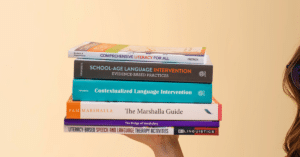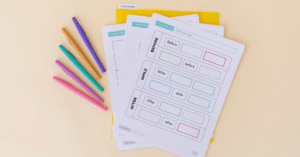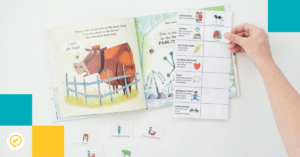I presented at the SLP Summit earlier this week, and it was so fun! We got to spend an hour talking about literacy-based therapy and teletherapy.
As promised, here is a roundup of your questions!
General Questions
Do you use one story all month, week, or pick a theme? How long does this go for per book?
It depends on the group, but we typically run with one book/article for a month. I see students with increased needs multiple times a week, so all groups typically end a book/article around the same time!
What age group are these activities most targeted to?
This can be applied to any age! We just want to make sure we’re selecting an appropriate text (from simple, repetitive books to nonfiction articles).
Can these strategies be modified for use in face to face therapy?
Absolutely! I love using technology to engage my students. All of the apps/websites/tools can be used in both settings.
Did you change how you wrote goals when you moved from drill to literacy-based therapy?
No! This framework can be used to target almost any goal.
Can you talk about data collection during sessions? Do you use data from these sessions for progress reports, or do you have more formal benchmarking for progress reports?
I like to take data at the beginning of each session. I use a probe (which is basically a mini assessment with 5-10 items). I don’t provide any support so I get a really good read on how the student is doing. This helps me determine how much support I’ll need to provide during the session (or how much teaching I need to do before we dive in). It gives me clean data and allows me to focus on being the best therapist I can during the bulk of the session. I simply document the level of support I provided in my “real therapy” at the end of the session. I have a rubric that helps me consistently report the level of support. Click here to read more about my system and access the free rubric (at the bottom of the post).
Finding a Text
Do you have a book list that you could share?
You can find my book list here.
Is there a reading level shown on these sites?
Yes! They all report reading levels a little differently, but they all include some measure of reading difficulty.
Step 1: Pre-Story Knowledge Activation
Do you take data during the pre-story knowledge activation?
I like to take data at the beginning of each session. I use a probe (which is basically a mini assessment with 5-10 items). I don’t provide any support so I get a really good read on how the student is doing. This helps me determine how much support I’ll need to provide during the session (or how much teaching I need to do before we dive in).
Can you tell us more about the sheet with story grammar visuals?
Yes! You can find them in the SLP Now membership. (They are linked in the description of every Book Activity.) Here’s a quick overview of how they work.
Step 2: Read
Do you recommend reading the story yourself or letting your students to read it or a mix of both?
It depends on the group! I use my clinical judgment to decide which option would be most helpful for the group.
Do you include any pauses or explanations along the way? Or do you just read?
I don’t add a lot to my reading. My main goal is to make sure that students are engaged.
Step 3: Post Story Comprehension
Do SLP Now members get access to Boom Cards?
Absolutely! We have 120+ decks! They are linked in the description of our No Print Books.
Step 4: Focused Skill Activities
How do you teach vocabulary? How do you select target words?
I have an entire course on this in the SLP Now Academy (which is part of the SLP Now Membership). If you’re not a member, you can sign up for a trial and access it for free!
What is a vocabulary journal?
A vocabulary journal is a way for student’s to document the words that they are learning. You can use it for a variety of vocabulary targets, but I find it especially helpful when targeting categories, object functions, multiple meaning words, prefixes/suffixes. Here’s an example!
Do you have suggestions for students who have syntax heavy goals?
There’s a course for that in the SLP Now Academy too! If you’re not a member, you can sign up for a trial and access it for free!
Do you have suggestions for students who use echolalia and lower language skills?
That is a great question! I did an interview with Venita Litvak from Speechie Side Up on the podcast. I think that’s a great place to start!
How can I share my iPad in teletherapy?
Here are a few options that SLPs have shared:
– Quicktime
– LonelyScreen
– Airserver
– Reflector (This is one that I’ve used!)
Step 5: Parallel Story
Can you show a parallel story?
Yes! This video and this video explain a little more!
Questions about SLP Now
What exactly is SLP Now?
SLP Now is a helps SLPs streamline their therapy planning. The membership includes access to a library of therapy materials and planning tools. Really, it includes everything you need to implement fun, engaging, and evidence-based therapy!
How much is the SLP Now membership?
You can find the details here!
If you join SLP Now, what type of support does a member have access to get going?
Lots! We have built in onboarding to help you get started as soon as you sign up. This usually does the trick. We worked really hard to make the site as simple and easy to use as possible!
If you do need extra help, we offer help articles, a “getting started” course in our Academy, and a chat button to reach out to our team at any time! There’s bound to be a solution for your learning style!
Does SLP Now also have a large amount of middle school materials?
Yes! We hired a secondary SLP to build out our materials for older students. The fiction articles, nonfiction articles, and video units are some of the most popular materials for that age group.
Link Round Up
Free Resources
– Planner
– Reward Card
Digital Books
– EdPuzzle
– Epic
– Vooks
– Your local library
Digital Articles
Interactive Activities
– Boom Cards
– Google Slides
– Genius Scan
– Nearpod
Reinforcers
– Reward Cards
– Dice
– JeopardyLabs
– Wheel Decide or Wheel of Names
– Toca Boca (iPad)
– Notability (iPad)
And the… SLP Now Backpack




Reader Interactions